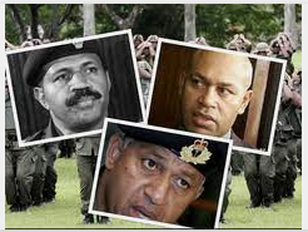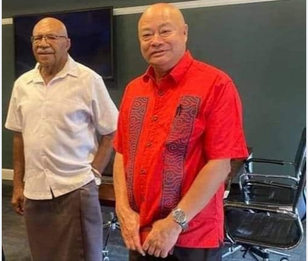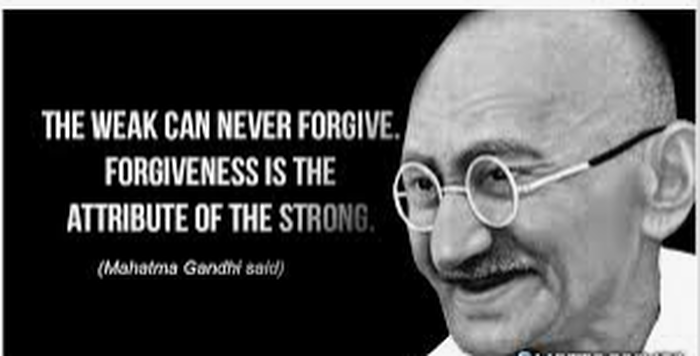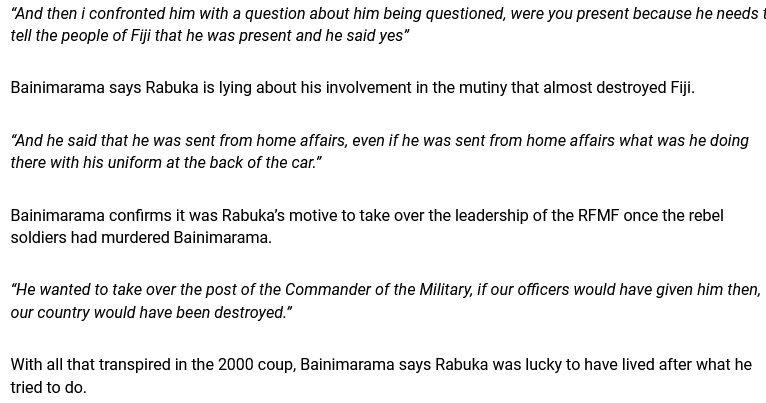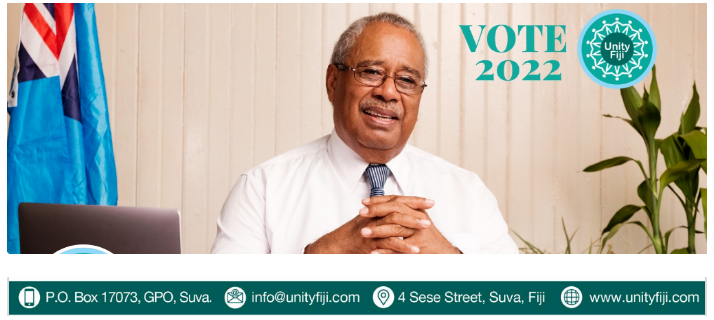.BLOODY 2000 MUTINY: It was just a pimple on the backside of Fiji's inglorious coup history. Come on, FORGET it, for it happened 22 Years ago. Maybe, Suva lawyer GRAHAM LEUNG should donate the $130,000 in fees that he received to flood victims. We may recall that the former Fiji Law Society president Leung was the Judge Advocate of the Court Martial panel that had tried the 20 soldiers convicted of mutiny in relation to the Speight coup of 2000. The Suva lawyer had been commissioned as an Army officer, with the rank of Lieutenant Colonel. Before Leung’s appointment a row had broken out between Bainimarama and the Minister for Defence Josefa Vosanibola over the payment fees of $130,000 to Leung, with Bainimarama arguing that the payment to Leung was being made from the Army budget (still to be audited) and that the Ministry of Home Affairs had no say in the payment. Just imagine if
RFMF Commander Ratu Jone Kalouniwai, who was held hostage during the mutiny, was told to just SHUT UP, Forgive and Forget (if Rabuka was allegedly involved) and move on - it bloody happened 22 years ago.
| Almost everyone in Fiji has a view on Mr Sitiveni Rabuka who staged the first coup in 1987 as a relatively young army officer. That single event has defined and informed Fiji’s politics for over three decades. I was totally opposed to that coup. Members of my family sold their home and fled Fiji in 1987. I have been opposed to every coup since then – 1987, 2000 and 2006. |
As a strong adherent of the rule of law and democracy, the unconstitutional removal of a government runs against the grain of what I have been taught and what I believe in.
The coups have destroyed lives and livelihoods, set this country back by generations and come at a huge cost.
I recognize that those responsible have not been held to account and justice has not been received by many who have been hurt or injured by these events.
They have debased our young democracy. Mr Rabuka’s day or reckoning will come, if not in this life, then in the next.
He will carry this heavy burden forever.
Love him or hate him, Mr Rabuka is an integral part of the Fiji story.
I truly believe that the Rabuka who was responsible for 1987 is a changed man. He has apologized for his role in those events.
He was forgiven by the leader of the NFP the then leader of the largest Indian party, Jai Ram Reddy and together they worked to produce the 1997 Constitution which led to equality of Fiji’s races and the formation of a genuine multiracial cabinet.
Mr Reddy was a victim of the 1987 coup but he set aside his personal hurt and feelings in the wider national interest. This act of statesmanship destroyed his political career.
If Mr Reddy was able to collaborate with Mr Rabuka, that is good enough for me.
In February 1990, the then president of South Africa, FW de Klerk, took the fateful decision to release Nelson Mandela who later became President.
Mandela was later to form a political partnership with his arch enemy although their political views were diametrically opposed at one stage.
What President Mandela has taught the world is that it is possible to forgive one’s political enemies and work together for the common good.
Fiji has had 14 years of one party rule.
The record of government during that period has been dismal – unprecedented levels of poverty, decrepit infrastructure as evidenced by frequent water cuts and power outages, diminution of human rights, extraordinarily high levels of external debt and mismanagement at all levels.
Democracy needs to be refreshed and reinvigorated from time to time.
Any government that is in power for too long tends to become arrogant, complacent and authoritarian. They stop listening to the people.
The coming elections this year provides voters a chance to have more of the same, or the choice of a new government that has the ability to take Fiji out of the wilderness.
None of the parties or their leaders are perfect. All of them have weaknesses, just as they have strengths.
None of us are perfect. That is the nature of being human.
The electoral system in the Fiji Constitution is skewed and unfair.
A political party or candidate cannot qualify for a seat in Parliament unless they win at least 5% of the votes cast.
That is a very high bar and which many candidates and small parties will be unable to reach.
Some other opposition leaders have outstanding records, but regrettably the electoral system places them in a disadvantageous situation.
Reviewing the current political landscape, I believe Mr Sitiveni Rabuka is the leader who will best be able to take Fiji forward and bring the changes that Fiji needs at this time.
He is humble and compassionate.
He is a leader that listens.
He has learnt from his past mistakes.
He has the experience of being a former head of government.
I trust him.
The founders of Mr Rabuka’s party give me confidence that if they win a majority of seats in the general elections, Fiji will have a government that is kinder, gentler and more inclusive.
The coups have destroyed lives and livelihoods, set this country back by generations and come at a huge cost.
I recognize that those responsible have not been held to account and justice has not been received by many who have been hurt or injured by these events.
They have debased our young democracy. Mr Rabuka’s day or reckoning will come, if not in this life, then in the next.
He will carry this heavy burden forever.
Love him or hate him, Mr Rabuka is an integral part of the Fiji story.
I truly believe that the Rabuka who was responsible for 1987 is a changed man. He has apologized for his role in those events.
He was forgiven by the leader of the NFP the then leader of the largest Indian party, Jai Ram Reddy and together they worked to produce the 1997 Constitution which led to equality of Fiji’s races and the formation of a genuine multiracial cabinet.
Mr Reddy was a victim of the 1987 coup but he set aside his personal hurt and feelings in the wider national interest. This act of statesmanship destroyed his political career.
If Mr Reddy was able to collaborate with Mr Rabuka, that is good enough for me.
In February 1990, the then president of South Africa, FW de Klerk, took the fateful decision to release Nelson Mandela who later became President.
Mandela was later to form a political partnership with his arch enemy although their political views were diametrically opposed at one stage.
What President Mandela has taught the world is that it is possible to forgive one’s political enemies and work together for the common good.
Fiji has had 14 years of one party rule.
The record of government during that period has been dismal – unprecedented levels of poverty, decrepit infrastructure as evidenced by frequent water cuts and power outages, diminution of human rights, extraordinarily high levels of external debt and mismanagement at all levels.
Democracy needs to be refreshed and reinvigorated from time to time.
Any government that is in power for too long tends to become arrogant, complacent and authoritarian. They stop listening to the people.
The coming elections this year provides voters a chance to have more of the same, or the choice of a new government that has the ability to take Fiji out of the wilderness.
None of the parties or their leaders are perfect. All of them have weaknesses, just as they have strengths.
None of us are perfect. That is the nature of being human.
The electoral system in the Fiji Constitution is skewed and unfair.
A political party or candidate cannot qualify for a seat in Parliament unless they win at least 5% of the votes cast.
That is a very high bar and which many candidates and small parties will be unable to reach.
Some other opposition leaders have outstanding records, but regrettably the electoral system places them in a disadvantageous situation.
Reviewing the current political landscape, I believe Mr Sitiveni Rabuka is the leader who will best be able to take Fiji forward and bring the changes that Fiji needs at this time.
He is humble and compassionate.
He is a leader that listens.
He has learnt from his past mistakes.
He has the experience of being a former head of government.
I trust him.
The founders of Mr Rabuka’s party give me confidence that if they win a majority of seats in the general elections, Fiji will have a government that is kinder, gentler and more inclusive.
